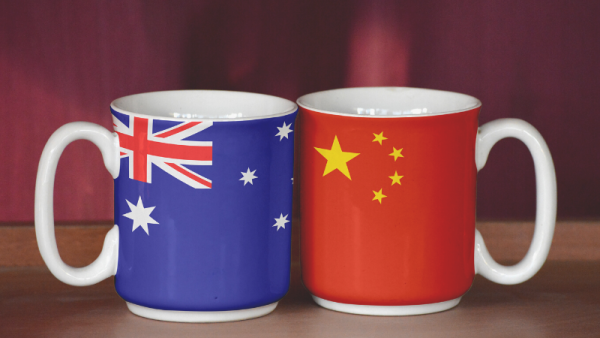Aritra Deb / Shutterstock

Jing Han, Director, Australia-China Institute for Arts and Culture, Western Sydney University |
Perspectives is UTS:ACRI's monthly commentary series, featuring a piece on a topical subject in the Australia-China relationship from an invited expert contributor.
The current debate on Australia’s relations with the People’s Republic of China (PRC) has become markedly binary. If you actively participate in discourse on the matter there is every likelihood you will be labelled either be pro- or anti- China. If you advocate for engaging with the PRC, you may be suspected of being influenced by Chinese Communist agents and jeopardising national security. Critics of engagement also argue that the PRC has changed under Xi Jinping with Communist Party ideology greatly elevated, leaving opportunities for genuine two-way exchange much diminished.
The fact is that the PRC has been a communist country since 1949 and this did not stop Australia from establishing diplomatic relations in 1972. Nor did it subsequently prevent Australia and the PRC from developing a constructive and mutually beneficial relationship over the following decades. The PRC, on the other hand, has undergone some fundamental changes since it opened to the world with Deng Xiaoping’s open-door policy and reforms. These changes benefitted from and were greatly influenced by its exchanges and connections with the outside world.
While Australia’s close relations with the PRC are frequently viewed through a trade and economic lens, arts and cultural exchanges have been at the heart of bilateral engagement and influence since the late 1970s and has thrived since the 1980s.
In 1986, then-Prime Minister Bob Hawke paid a special visit to the Australian Studies Centre at Beijing Foreign Studies University, the first such centre in the PRC, established by Professor Hu Wenzhong, who had been one of the first group of nine PRC scholars studying at the University of Sydney. In the same year, former Prime Minister and Chair of the Australia China Council, Gough Whitlam, visited the newly established Australian Studies Centre at East China Normal University. Finding an office with barely filled bookshelves, after Whitlam’s return to Australia, the Council sent 10 boxes of books to the Centre. Under current circumstances, such visits seem unimaginable. Forty years on, however, Australian Studies are well established in the PRC, with some 36 centres promoting understanding and engagement through education and research in history, economy, literature and culture.
Starting from the late 1980s when the PRC had opened to the world, a large group of artists came to Australia, who have since made tremendous contributions to the contemporary art scene. They include critically-acclaimed figures such as Guan Wei, Guo Jian, Shen Jiawei, Ah Xian, Zu Tianli, Zhou Xiaoping, and they continue to create amazing artworks through their unique integration of Chinese and Australian cultures, traditions and experiences.
What is notable is that in 2020 – even as Xi Jinping’s centrality in the Communist Party continues to grow, great power competition returns, bilateral political tensions between Australia and the PRC spike and the trade relationship has begun to suffer - you can be sure that at any one time there will be multiple art exhibitions around Australia by Chinese or Chinese-Australian artists. Zhou Xiaoping is the most recent Chinese-Australian artist to exhibit at the Australia-China Institute for Arts and Culture (ACIAC) at Western Sydney University (WSU). His exhibition, Spiritual Bonding between Land and People, celebrates his extraordinary 30-year artistic journey from the PRC to Arnhem Land, his unique bond and friendship with Indigenous people and his collaborative work with artists such as Jimmy Pike and Johnny Bulunbulun. Many Chinese-Australian artists actively engage with the PRC, and Zhou Xiaoping was responsible for the first exhibition of Aboriginal artworks in the PRC.
Introducing Indigenous writing to a Chinese readership is the focus of the Australia-China Institute for Arts and Culture’s (ACIAC) ‘Translation of Contemporary Australian Literature Program’ in collaboration with well-known literary translator Professor Li Yao and various PRC publishing houses. Currently on the translation list are 2019 Miles Franklin Award novel Too Much Lip by Melissa Lucashenko, 2020 Miles Franklin Award novel The Yield by Tara June Winch, 2020 Miles Franklin-shortlisted novel The White Girl by Tony Birch and Born into This, a collection of short stories by emerging Indigenous writer Adam Thompson.
There is a long history of literary exchanges with the PRC. The China Australia Literary Forum (CALF) started in 2011 as a collaboration between the China Writers Association and the Writing and Society Research Centre at WSU. CALF has taken place every other year alternately in the PRC and Australia. By 2019, five forums had featured many prominent writers including Nobel Prize winners Mo Yan and J.M. Coetzee. At the initiation of China Writers Association, on December 10 2020, despite the continued downward spiral of bilateral relations between Australia and the PRC, ACIAC and China Writers Association, with additional sponsorship from the Australia Council, will co-host an inaugural online forum, ‘Chinese and Australian Writers in Dialogue’. Six prominent writers from each country will exchange thoughts on the theme: ‘Pandemic, Reflection and Creation’.
The flagship program Australian Writers Week, run by the Australian Embassy in Beijing, also continues this year, moving online. The 2020 program focuses on conversations between Australian and Chinese writers and ACIAC is a proud partner. It is encouraging to see that writers do not seem to be deterred by geopolitical tensions between governments.
There is no doubt that the PRC’s economy will continue to grow and along with it its ambition and power in the region will grow too. The PRC needs to change, but only when one engages the PRC will one able to influence its change. Arts and cultural exchanges will continue to play an important and unique role in normalising and achieving mutually beneficial bilateral relations, especially when diplomacy appears to be lacking on both sides.
Author
Professor Jing Han is Director of the Australia-China Institute for Arts and Culture at the Western Sydney University and a leading expert in translating Chinese culture, intercultural communication, audiovisual translation and media accessibility.


